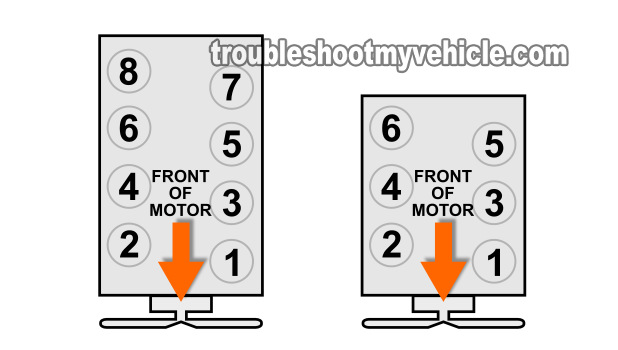What Tests Can I Perform To Find The Cause Of The Misfire Condition?

There is a logical starting point for troubleshooting a misfire condition and it all starts by reading the diagnostic trouble codes stored in the PCM's memory with your scan tool Actron CP9580 Scan Tool).
What you're looking for, are the misfire codes that will identify which cylinder is the one misfiring. So, then the first order of business is to identify the dead cylinder. This is accomplished by matching the misfire code to it's engine cylinder using an illustration of the engine cylinders, like the one in the image above.
Once you've found the dead cylinder, your next step is to find out what's missing from it. It's gonna' be one of three things: spark, or fuel, or air (compression).
The following are my recommendations as to what to start testing first. Although you don't have to follow the list in that particular order:
STEP 1: Since the majority of misfire are caused by a failed component in the ignition system, the first test you should perform is a spark test (using a dedicated spark tester) on the spark plug wire of the cylinder that the misfire code is accusing of being dead. This is the most important first test since you'll know right away if the misfire is due to a lack of spark.
The following tutorial will help, in a step-by-step way, how to test the ignition system for a misfire:
- How To Test A Misfire / No Spark-No Start Condition (4.3L, 5.0L, 5.7L 96-04) (at: easyautodiagnostics.com).
STEP 2: If you got spark from your spark tester (from the cylinder the misfire code is accusing of misfiring), the next step is to remove the spark plug or spark plugs (of the affected cylinders) and check them for wear and tear, carbon tracks, anti-freeze, etc.
STEP 3: If testing the ignition system tells you that the problem is somewhere else, then next steps are checking the 'Spider' fuel injector assembly (inside the intake manifold plenum to see if it's leaking fuel) with a fuel pressure gauge.
The test that'll help you check for a leaking 'Spider' fuel injector assembly is a fuel pressure leak down test and if you've never done one, the following tutorial will show you how:
Other tests that should be done, if the fuel injector 'Spider' assembly checks out OK and is not leaking are: compression tests, vacuum leaks, etc.
You can find the engine compression test here:
The above list of steps may seem/sound like troubleshooting a misfire is a complicated thing but it really isn't. Depending on your level of 'wrenching' experience, this is something that you can accomplish without taking it to the shop.
Also, I have written the articles that will cover most of the tests described above that will help you to diagnose the misfire (you'll find the links to them in the next page in the section: Where Do I Find The Test Articles?).
What Tools Do I Need To Test The Misfire Code(s)?
Finding the exact cause of the misfire codes or misfire condition is possible with the proper tools. Without them, you won't be able to diagnose/troubleshoot those issues on your GM 4.3L, 5.0L, 5.7L pick up, SUV, van or mini-van.
Depending on what the root cause of the misfire is, you may need several tools. Most of these you can buy online, none of these will break the bank and I'll make some recommendations on them. Here's a guide to some of the basic tools that can be and are used:
- Ignition System Tests:
- Spark tester.
- Multimeter.
- 12 Volt test light.
- Fuel System Tests:
- Noid light.
- Fuel pressure gauge.
- Multimeter.
- Engine Mechanical Tests:
- Compression tester.
Now of course, you'll also need basic hand tools like: screw-drivers, ratchet wrenches, sockets, etc. You'll also need a generic scan tool to retrieve the diagnostic trouble codes (DTCs) from the computer's memory.
Keep in mind that using the right tool for the job will save you time, frustration, and/or keep you from damaging the component that you're testing.
Is This Something I Can Do? Or Do I Need To Take It To A Repair Shop?
Most of the tests that you'll need to perform on your GM 4.3L, 5.0L, 5.7L pick up, SUV, van or mini-van are simple and easy. Even someone with little practical 'wrenching' experience can easily accomplish them.
The deciding factor, to either troubleshoot the car or pickup yourself or take it to an auto repair shop, is if you have or don't have the necessary tools and the time required to perform the tests. Here are a couple of questions to consider:
- Do I have all of the required info (such as repair manual, online testing info, etc.) to diagnose/troubleshoot the vehicle myself?
- Do I have the patience to work on my own car?
- What level of 'wrenching' experience do I have?
- Do I have the time to invest in troubleshooting and then repairing the issue? Or am I pressed for time?
Where Do I Find The Test Articles?
Below are some of the 'How To' tutorials that will help you find the root cause of your misfire condition:
- How To Test The Engine Compression (GM 4.3L, 5.0L, 5.7L).
- How To Test A Misfire / No Spark-No Start Condition (4.3L, 5.0L, 5.7L 96-04) (at easyautodiagnostics.com).
- How To Diagnose A Hard To Find Misfire Case Study (GM 4.3L, 5.0L, 5.7L).
- How To Test The 'Spider' Fuel Injector Assembly (4.3L, 5.0L, 5.7L).

If this info saved the day, buy me a beer!

